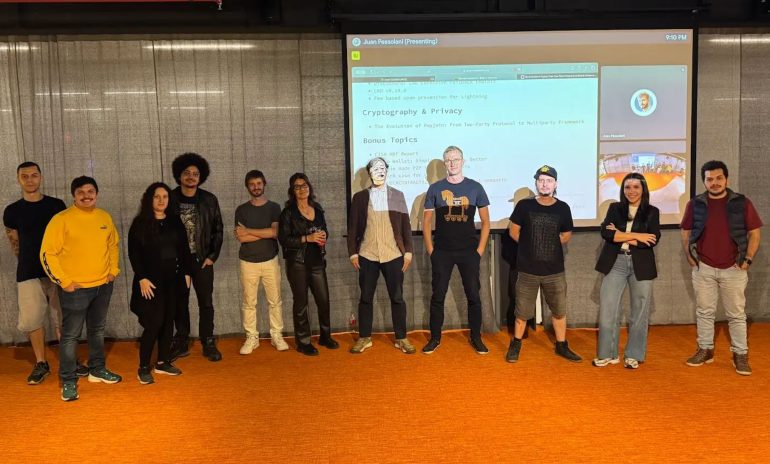On a balmy evening in early April, a small but vibrant group of tech enthusiasts, developers, and curious newcomers gathered in Asunción for the inaugural BitDevs meetup, organised by Bitcoin Paraguay. This event, held on April 9th, marked a pivotal moment for a country quietly carving out a space in the global Bitcoin conversation. Against a backdrop of regulatory uncertainty and untapped potential, Paraguay is emerging as a frontier for Bitcoin’s philosophical and technological promise—a promise that could redefine its economic future.
The BitDevs meetup, a forum born years ago in the cypherpunk undercurrents of the Bitcoin community, is no ordinary tech conference. It’s a Socratic Seminar, a roundtable where hierarchy dissolves, and ideas—whether from seasoned developers or wide-eyed beginners—collide freely. “Anyone can participate, share opinions, or ask questions, regardless of their level of knowledge,” says Lorena Almada, a member of Bitcoin Paraguay. The Asunción event drew a diverse crowd: coders dissecting Bitcoin’s cryptography, enthusiasts debating its libertarian ethos, and newcomers intrigued by its potential to transcend centralised financial systems. Topics ranged from the core Bitcoin protocol to the Lightning Network, a layer for faster transactions, and even PayJoin V3, a community-proposed privacy solution.
For Paraguay, a landlocked nation long overshadowed by its larger neighbors, this gathering signals something deeper than a tech meetup. It’s a spark of grassroots ambition in a country whose tech ecosystem is still in its infancy. “We are in a very early phase when it comes to Bitcoin,” Almada admits, but the momentum is undeniable. Just last year, Paraguay hosted its first “Bitcoin-only” event, the Bitcoin Halving Party in Ciudad del Este, uniting enthusiasts from Brazil, Argentina, and beyond. Since then, Bitcoin Paraguay has grown into a community hub, offering beginners-friendly workshops, monthly meetups, and, soon, a free Bitcoin diploma program led by trainers from El Salvador’s Mi Primer Bitcoin initiative.
What makes Paraguay fertile ground for Bitcoin’s ethos? For one, its youthful, tech-savvy population—hungry for innovation and unburdened by legacy systems. “Our young developers are quickly growing in number,” says Jan Kotas, a community leader. Add to that Paraguay’s reputation as a haven of relative freedom, a magnet for Bitcoiners fleeing restrictive regimes elsewhere. “The freedom Paraguay offers is attracting Bitcoiners from around the world—many already call this country home,” Kotas notes. He envisions Asunción as a potential financial hub, akin to Singapore or Dubai, if it plays its cards right.
Yet, the road ahead is fraught with challenges. Paraguay’s flirtation with Bitcoin has been something of a rollercoaster experience. Once a darling of Bitcoin miners, thanks to its abundant hydroelectric power, the attraction started to fade when ANDE, the national electricity authority, imposed a licensing and taxation regime on cryptocurrency miners, who now have to pay a slightly higher tariff for electricity than other businesses—a move which came after a large number of cryptocurrency mining equipment was discovered to be illegally stealing the already cheap electricity from the national power grid. A lack of knowledge about Bitcoin in wider society is reflected in the halls of power, with many people conflating it with speculative cryptocurrencies or outright scams, and the aforementioned electricity thieves. The regulatory landscape remains a gray zone—neither banning Bitcoin nor embracing it. This ambiguity leaves businesses hesitant, and citizens wary.
Still, the global tide is shifting, and Paraguay has the potential to go either way. Countries like El Salvador, Bhutan, and the UAE have embraced Bitcoin as a strategic asset, Switzerland allows taxes to be paid with it, while corporations worldwide add it to their balance sheets. “Paraguay still has a chance to join this global race,” Kotas insists, “but the train is leaving the station.” The key, both he and Almada agree, is education. Bitcoin Paraguay’s efforts—workshops, academic partnerships with institutions like the Economics Club at UNA, and community-driven events—are chipping away at misconceptions. “Bitcoin isn’t just speculative trading,” Almada emphasises.
The Asunción BitDevs meetup offered a glimpse of what’s possible when ideas cross borders. Developers from around the world shared insights, revealing both Paraguay’s potential and its missed opportunities so far. Most Bitcoin development still flows from the U.S., Europe, and China, with technical content often locked behind English-language barriers. Yet, Paraguay’s developers are catching up fast, fueled by open-source ideals and a hunger to learn. “The exchange of ideas fosters critical thinking,” Almada says. Kotas adds a bolder vision: by welcoming free and open-source software developers facing threats elsewhere, Paraguay could become a sanctuary for innovation, much like El Salvador.
How to get involved with the next BitDevs meetup
For now, Bitcoin Paraguay is focused on the grassroots. Monthly meetups draw over 100 attendees, sparking startup ideas and inspiring businesses to accept Bitcoin as payment. “Education is key,” Almada repeats, a mantra for a movement that thrives on understanding over hype. Plans for a second BitDevs are underway, with no fixed date but a clear focus: keeping pace with Bitcoin’s ever-evolving ecosystem. For newcomers, the door is wide open. “You don’t need deep technical knowledge,” Almada says. “Visit bitcoinparaguay.org and join our local meetups. It is the best way to start.”
Paraguay stands at a crossroads. It could remain a bystander in the Bitcoin revolution or seize its moment to become a beacon of innovation. The Asunción BitDevs meetup, small as it was, carried the weight of that choice. In a world where financial systems are being reimagined, Paraguay’s young dreamers and developers are quietly laying the groundwork for a future that could surprise us all.


